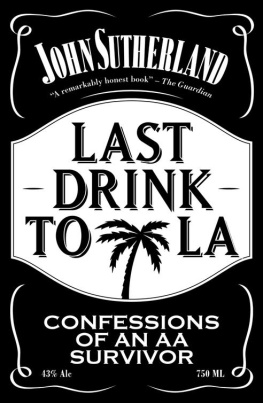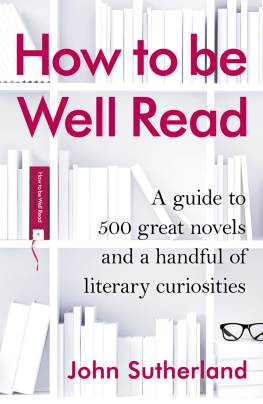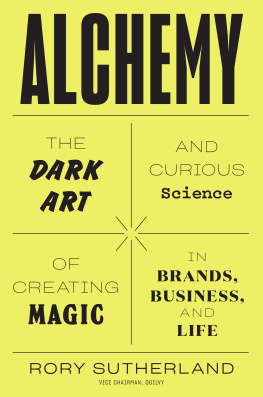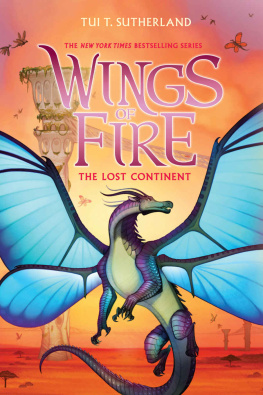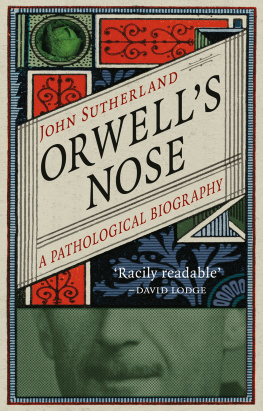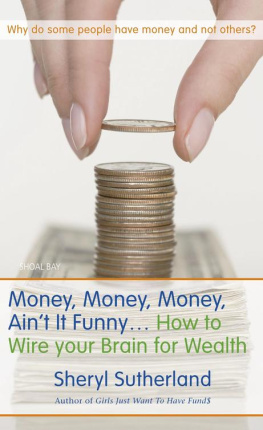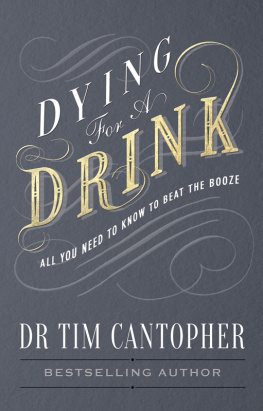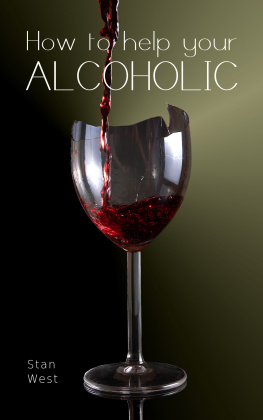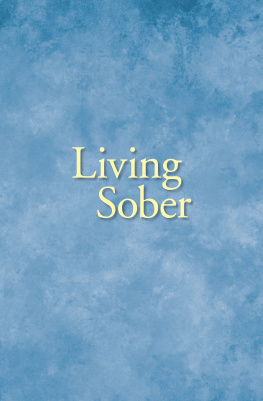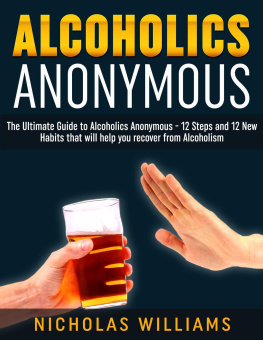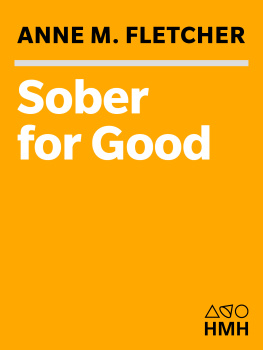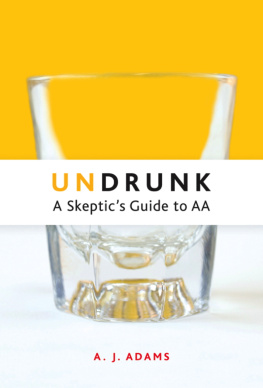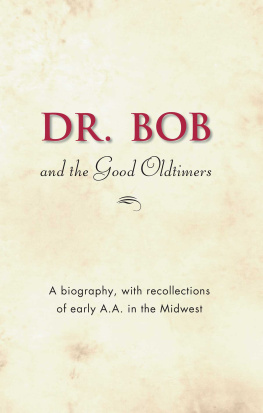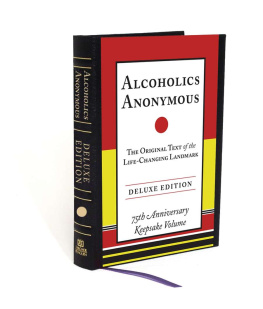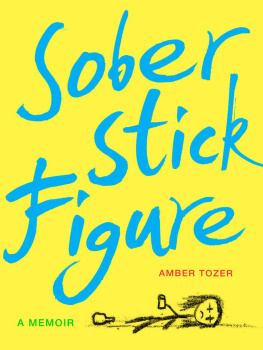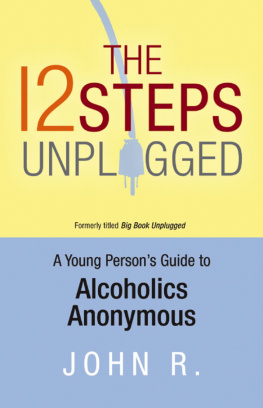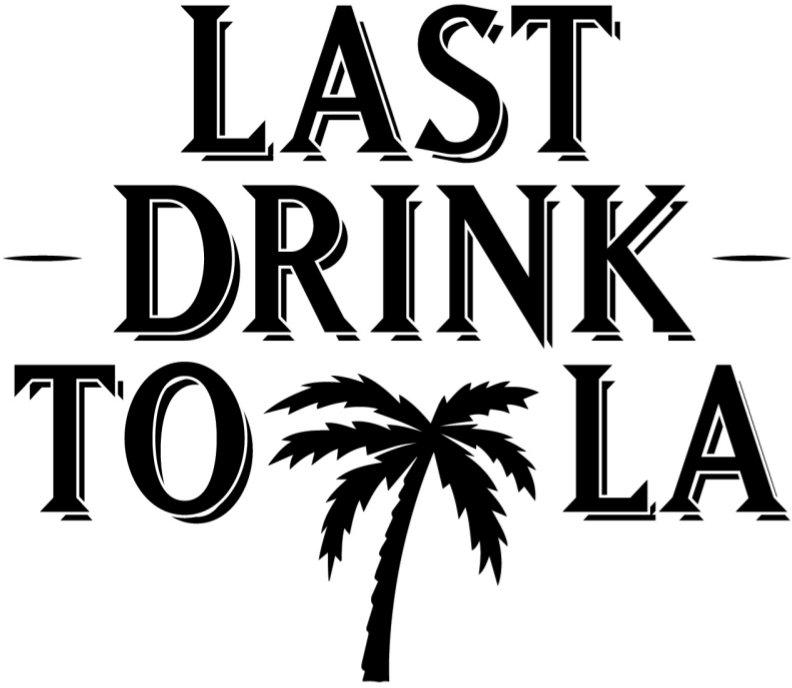A remarkably honest book The Guardian
John Sutherland is among the handful of critics whose every book I must have. Hes sharp-eyed and sharp-tongued, with a generous heart and a wise head.
Jay Parini author of The Last Station
Last Drink To LA is an enlightening and courageous book, and quite different from the wallowing, breast beating, confessional splurge one might be offered from a media celebrity. This, in contrast, offers analysis and hope, and should be required reading in all surgeries and branches of AA. Goth Lady, Amazon review
I dont know much about literature. I'm just a working class builder who struggles with drink. Its a superb book, full of insight and the sort of stuff that sticks around and bubbles up out of your subconscious when you need it to.
Andrew Henry, Amazon review
Contents
I got drunk in many places and got sober in Los Angeles with the help of Alcoholics Anonymous. I no longer reside in Los Angeles, nor am I nowadays an attender of AA meetings. Nor, in writing this, can I claim to have safeguarded my anonymity, as conscientious members of the fellowship are enjoined to. But, as I console myself, AA is a forgiving organisation.
I am not drinking just now. Nor have I drunk alcohol for three decades (ten undergraduate degrees, six PhDs, five Californian marriages, and three life sentences for murder, as it pleases me fancifully to calculate). I abhor the preferred AA term for sober initiates recovering alcoholics which has to my ear a Uriah Heepish ring. I prefer to think of myself as past it; over that hill, a veterano, as the Hispanics (who honour such oldsters) say.
And, I will confess, I am no longer up to the strenuous physical demands of booze. Serious drinkers, as they jestingly call themselves, enjoy a longer career than football players, but not much. Practising (as opposed to recovering) alcoholism is not for weaklings. Books are easier. I have written many books since sobering up this, I hope, is among the more honest.
For what it is worth, this book is a meditation. It is not a temperance tale (How I Conquered the Demon Rum). Nor is it a treatise on the disease of alcoholism (if one is wanted, I would recommend Alcoholism by Neil Kessel and Henry Walton; it used to be available as a Penguin but will now have to be hunted down second-hand). Least of all is this what AA calls a drunkalog or drunkards exemplary tale (How the Demon Rum Conquered Me) told to terrify, inform and instruct. Just some thinking about drinking.
PS. I have made minor changes to the text which follows, to even out what would be, after 13 years, anachronisms. Ive also written an epilogue, looking back from my present place and time of life (October 2014).
S ome would say (certainly many members of AA) that only those who have plumbed the abyss will ever know the huge semantic gaps that lie between the simple sentences I have drunk, I am drunk and I am a drunk. The white-coated experts know least of all. In this area of medical research only the guinea pigs wear the white coats; they alone are expert. I myself used to drink, as they say, like a fish (except, as I understand it, fish dont drink, any more than the maligned newt gets inebriated himself). Drink practically killed me as it actually kills hundreds of thousands of my drunken fellow-citizens every year; cut off, many of them before their time.
It would have been of no great moment had I drunk myself to death in the early 1980s, my forties and the climacteric of my drinking career. There would have been no banner announcements or half-page obituaries in the press; no solemn minute of silence in my employing institution (although I believe, as a Reader in English, I would have warranted a days half-mast of the college flag at UCL. As far as the world was concerned, the demise of Sutherland would have been just another sot gone to his liquid grave. Good riddance.
Death certificates do not use the term alcoholism as cause of death too vague. But there are, by modest calculation, a hundred such mortalities a day (three times the daily number of deaths by road accidents; innumerably more than are stabbed, strangled or shot to death in the UK). The response of those bereaved of my presence would have been discreetly masked relief. Whatever there was to lose had been lost (passed away, as they say) years ago. Money, trust, houses, job, marriage, liver, lights and lungs. Above all respect. There are many Shakespearean lines that resonate for drunks, but none more so than Othellos agonised adieu to the worlds admiration:
O, now, for ever
Farewell the tranquil mind! farewell, content!
Farewell the plumd troops and the big wars
That make ambition virtue!
There are, by official estimate, some 300,000 lives terminated or shortened by alcohol abuse in the UK every year. The figures vary, decade to decade but they are invariably huge. Society at large is admirably stoical about this annual Passchendaele, as it is about the fewer (but still staggeringly numerous) citizens who wipe themselves out on the roads, day in, day out. People must travel; people must drink; fish gotta swim.
Often, of course, the two bills of mortality converge: alcohol is reckoned to be a factor in over 50 per cent of automobile crashes particularly after the pubs and bars close and the A&E rooms move on to red-alert for the nocturnal tsunami of blood, liquor and petroleum spirit that washes into the countrys hospitals. Among those waiting for treatment will be a sizable number of sober victims of alcohol: 40 per cent of violent crime and 90 per cent of assaults in Britain are recorded as being alcohol-related. Domestic assault is, overwhelmingly, done in drink. Cheers.
By the modest estimate that ten per cent of the adult population are problem drinkers, the British census is around five million and the American four times that figure. A sombre calculation. According to Alcohol Concerns latest spoilsport bulletins, three out of four British adults have had their lives severely disrupted by their own or someone elses alcohol abuse. And what does that bleak Latinism disruption mean? Blood, bruises, scratches, curses, screams.
In October 2000, the sociologist Betsy Stanko took a snapshot of domestic violence in Britain and came up with the headline-grabbing statistic that there were, over the course of any day, an average of 600 incidents and hour. Over half a million acts of domestic violence are reported each year in Britain, and many more, given the behind-doors nature of the offence, elude official notice. Alcohol figures in most of these invisible crimes; the sober thump is, apparently, a rarity.
It needs, as Horatio would say, no sociologist to tell us these things. Circumspice; a drinks monuments are everywhere around us. Alcoholism is immensely destructive. And expensive. Every few months some committee or other will tot up the zillions it costs the country in road accidents, premature death, burden on the health service, family breakdown, suicide, homicide, assault, bankruptcy, homelessness, police, probation and court time.
Why do you drink? the Little Prince asks the drunkard in Saint-Exuprys fable. Because I am unhappy, the drunkard replies. Why are you so unhappy? Because I drink. Alcoholic logic.
In the face of this carnage and misery, society displays an amazing degree of Alcohol Unconcern. Abuse is serenely tolerated. If a pretender to the premiership boasts, as a lad, to have drunk 14 pints, or a premiers son is found paralytic after his many pints in Leicester Square, or the third in line to the throne reels drunkenly out of a night club in the early hours of the morning, lashing out at importunate paps, it is thought of as no more than a manly rite of passage. Beer street is as wholesomely British as it was in Hogarths day; not so Drug Lane.

